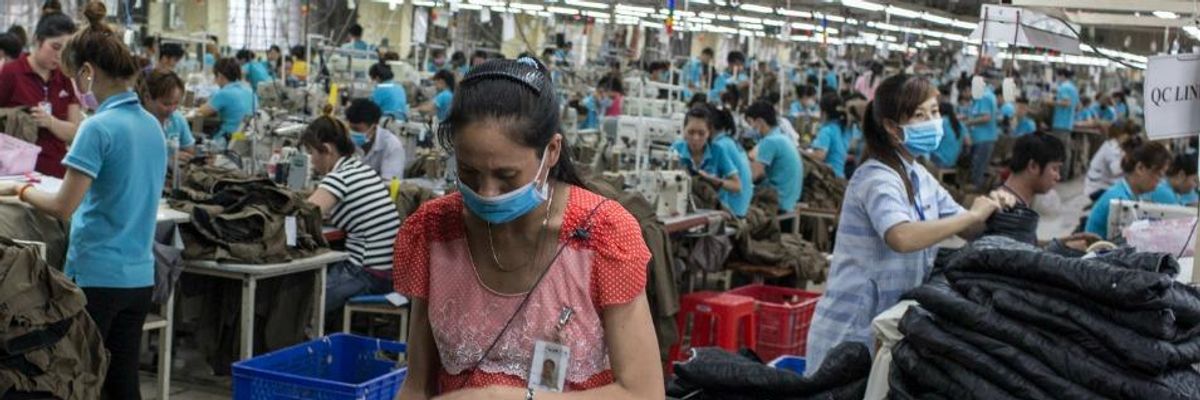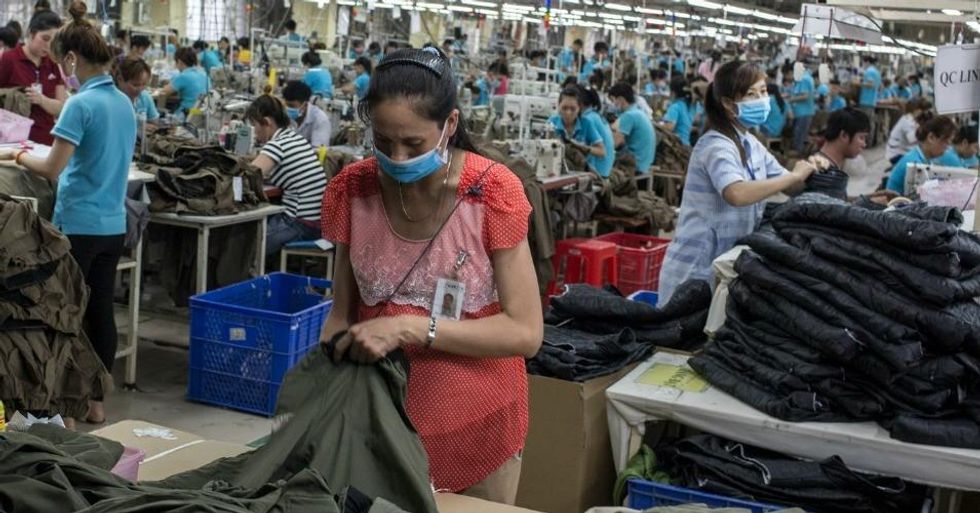

SUBSCRIBE TO OUR FREE NEWSLETTER
Daily news & progressive opinion—funded by the people, not the corporations—delivered straight to your inbox.
5
#000000
#FFFFFF
To donate by check, phone, or other method, see our More Ways to Give page.


Daily news & progressive opinion—funded by the people, not the corporations—delivered straight to your inbox.

A pregnant woman checks clothes made for international brands at a garment factory in Dong Nai province, Vietnam, on November 21, 2017. (Photo: Sam Tarling/Oxfam International)
Call it the 'Year of the Billionaire.'
In 2017, a new billionaire was created every two days and while 82 percent of all wealth created went to the top 1 percent of the world's richest while zero percent--absolutely nothing--went to the poorest half of the global population.
"The billionaire boom is not a sign of a thriving economy but a symptom of a failing economic system. The people who make our clothes, assemble our phones and grow our food are being exploited to ensure a steady supply of cheap goods, and swell the profits of corporations and billionaire investors." --Winnie Byanyima, Oxfam International
That troubling information is included in Oxfam's latest report on global inequality--titled Reward Work, Not Wealth (pdf)--released Monday. In addition to the above, the report details how skyrocketing wealth growth among the already rich coupled with stagnant wages and persistent poverty among the lowest economic rungs of society means that just 42 individuals now hold as much wealth as the 3.7 billion poorest people on the planet.
"The billionaire boom is not a sign of a thriving economy but a symptom of a failing economic system," Winnie Byanyima, Oxfam's executive director of Oxfam International. "The people who make our clothes, assemble our phones and grow our food are being exploited to ensure a steady supply of cheap goods, and swell the profits of corporations and billionaire investors."
Among the report's key findings:
The report comes just as the world's economic and political elite are set to open the World Economic Forum, held annually in Davos, Switzerland. And why the global elite argue the summit's focus is addressing the world's most pressing problems, Oxfam found that the amount of new wealth which went to the world's top one percent in 2017 was roughly $762 billion--a figure large enough, the group points out, to end extreme global poverty seven times over.

What the report ultimately exposes, Mark Goldring, Oxfam GB chief executive, told the Guardian, is a "system that is failing the millions of hardworking people on poverty wages who make our clothes and grow our food."
"For work to be a genuine route out of poverty we need to ensure that ordinary workers receive a living wage and can insist on decent conditions, and that women are not discriminated against," he added. "If that means less for the already wealthy then that is a price that we--and they--should be willing to pay."
Not just cataloging and lamenting the metrics of inequality, the new report also puts forth a number of policy solutions that should be embraced by people and governments worldwide to reduce levels of inequality and lift billions of people out of extreme poverty. They include:
Though Oxfam has been calculating global inequality on an annual basis for more than a decade, the anti-poverty group notes that this year's report used new data from Credit Suisse and a separate kind of model. Specifically, Oxfam noted, the fact that the world's 42 richest billionaires have as much wealth as the poorest bottom half "cannot be compared to figures from previous years - including the 2016/17 statistic that eight men owned the same wealth as half the world - because it is based on an updated and expanded data set published by Credit Suisse in November 2017. When Oxfam recalculated last year's figures using the latest data we found that 61 people owned the same wealth as half the world in 2016 - and not eight."
Trump and Musk are on an unconstitutional rampage, aiming for virtually every corner of the federal government. These two right-wing billionaires are targeting nurses, scientists, teachers, daycare providers, judges, veterans, air traffic controllers, and nuclear safety inspectors. No one is safe. The food stamps program, Social Security, Medicare, and Medicaid are next. It’s an unprecedented disaster and a five-alarm fire, but there will be a reckoning. The people did not vote for this. The American people do not want this dystopian hellscape that hides behind claims of “efficiency.” Still, in reality, it is all a giveaway to corporate interests and the libertarian dreams of far-right oligarchs like Musk. Common Dreams is playing a vital role by reporting day and night on this orgy of corruption and greed, as well as what everyday people can do to organize and fight back. As a people-powered nonprofit news outlet, we cover issues the corporate media never will, but we can only continue with our readers’ support. |
Call it the 'Year of the Billionaire.'
In 2017, a new billionaire was created every two days and while 82 percent of all wealth created went to the top 1 percent of the world's richest while zero percent--absolutely nothing--went to the poorest half of the global population.
"The billionaire boom is not a sign of a thriving economy but a symptom of a failing economic system. The people who make our clothes, assemble our phones and grow our food are being exploited to ensure a steady supply of cheap goods, and swell the profits of corporations and billionaire investors." --Winnie Byanyima, Oxfam International
That troubling information is included in Oxfam's latest report on global inequality--titled Reward Work, Not Wealth (pdf)--released Monday. In addition to the above, the report details how skyrocketing wealth growth among the already rich coupled with stagnant wages and persistent poverty among the lowest economic rungs of society means that just 42 individuals now hold as much wealth as the 3.7 billion poorest people on the planet.
"The billionaire boom is not a sign of a thriving economy but a symptom of a failing economic system," Winnie Byanyima, Oxfam's executive director of Oxfam International. "The people who make our clothes, assemble our phones and grow our food are being exploited to ensure a steady supply of cheap goods, and swell the profits of corporations and billionaire investors."
Among the report's key findings:
The report comes just as the world's economic and political elite are set to open the World Economic Forum, held annually in Davos, Switzerland. And why the global elite argue the summit's focus is addressing the world's most pressing problems, Oxfam found that the amount of new wealth which went to the world's top one percent in 2017 was roughly $762 billion--a figure large enough, the group points out, to end extreme global poverty seven times over.

What the report ultimately exposes, Mark Goldring, Oxfam GB chief executive, told the Guardian, is a "system that is failing the millions of hardworking people on poverty wages who make our clothes and grow our food."
"For work to be a genuine route out of poverty we need to ensure that ordinary workers receive a living wage and can insist on decent conditions, and that women are not discriminated against," he added. "If that means less for the already wealthy then that is a price that we--and they--should be willing to pay."
Not just cataloging and lamenting the metrics of inequality, the new report also puts forth a number of policy solutions that should be embraced by people and governments worldwide to reduce levels of inequality and lift billions of people out of extreme poverty. They include:
Though Oxfam has been calculating global inequality on an annual basis for more than a decade, the anti-poverty group notes that this year's report used new data from Credit Suisse and a separate kind of model. Specifically, Oxfam noted, the fact that the world's 42 richest billionaires have as much wealth as the poorest bottom half "cannot be compared to figures from previous years - including the 2016/17 statistic that eight men owned the same wealth as half the world - because it is based on an updated and expanded data set published by Credit Suisse in November 2017. When Oxfam recalculated last year's figures using the latest data we found that 61 people owned the same wealth as half the world in 2016 - and not eight."
Call it the 'Year of the Billionaire.'
In 2017, a new billionaire was created every two days and while 82 percent of all wealth created went to the top 1 percent of the world's richest while zero percent--absolutely nothing--went to the poorest half of the global population.
"The billionaire boom is not a sign of a thriving economy but a symptom of a failing economic system. The people who make our clothes, assemble our phones and grow our food are being exploited to ensure a steady supply of cheap goods, and swell the profits of corporations and billionaire investors." --Winnie Byanyima, Oxfam International
That troubling information is included in Oxfam's latest report on global inequality--titled Reward Work, Not Wealth (pdf)--released Monday. In addition to the above, the report details how skyrocketing wealth growth among the already rich coupled with stagnant wages and persistent poverty among the lowest economic rungs of society means that just 42 individuals now hold as much wealth as the 3.7 billion poorest people on the planet.
"The billionaire boom is not a sign of a thriving economy but a symptom of a failing economic system," Winnie Byanyima, Oxfam's executive director of Oxfam International. "The people who make our clothes, assemble our phones and grow our food are being exploited to ensure a steady supply of cheap goods, and swell the profits of corporations and billionaire investors."
Among the report's key findings:
The report comes just as the world's economic and political elite are set to open the World Economic Forum, held annually in Davos, Switzerland. And why the global elite argue the summit's focus is addressing the world's most pressing problems, Oxfam found that the amount of new wealth which went to the world's top one percent in 2017 was roughly $762 billion--a figure large enough, the group points out, to end extreme global poverty seven times over.

What the report ultimately exposes, Mark Goldring, Oxfam GB chief executive, told the Guardian, is a "system that is failing the millions of hardworking people on poverty wages who make our clothes and grow our food."
"For work to be a genuine route out of poverty we need to ensure that ordinary workers receive a living wage and can insist on decent conditions, and that women are not discriminated against," he added. "If that means less for the already wealthy then that is a price that we--and they--should be willing to pay."
Not just cataloging and lamenting the metrics of inequality, the new report also puts forth a number of policy solutions that should be embraced by people and governments worldwide to reduce levels of inequality and lift billions of people out of extreme poverty. They include:
Though Oxfam has been calculating global inequality on an annual basis for more than a decade, the anti-poverty group notes that this year's report used new data from Credit Suisse and a separate kind of model. Specifically, Oxfam noted, the fact that the world's 42 richest billionaires have as much wealth as the poorest bottom half "cannot be compared to figures from previous years - including the 2016/17 statistic that eight men owned the same wealth as half the world - because it is based on an updated and expanded data set published by Credit Suisse in November 2017. When Oxfam recalculated last year's figures using the latest data we found that 61 people owned the same wealth as half the world in 2016 - and not eight."